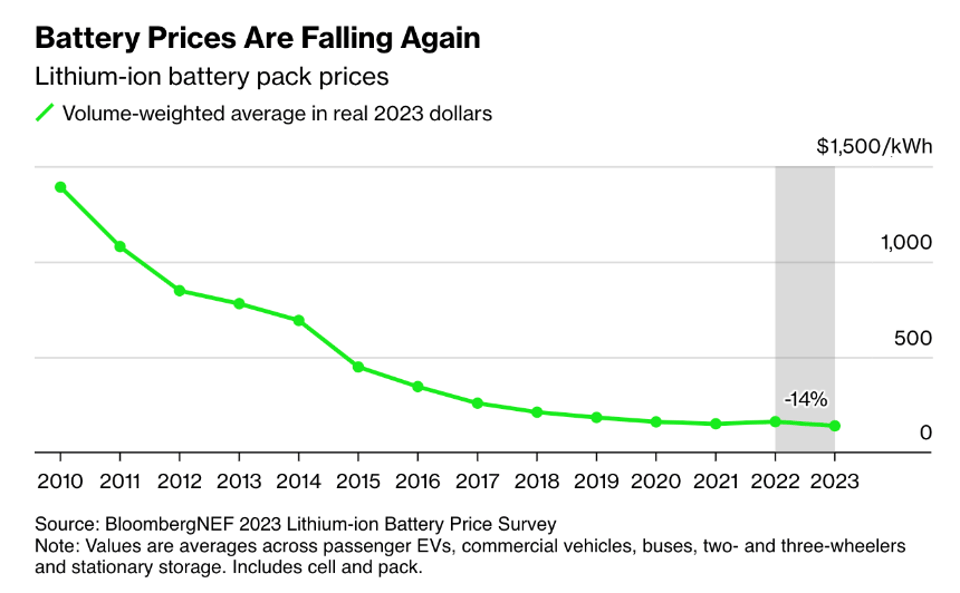Newsletter Published December 1, 2023 · 4 minute read
On the Grid: The EV Battery Price Drop 12/01/23
Mary Sagatelova

Delegations began gathering this week for the 28th Conference of the Parties (COP28), and even with President Biden remaining stateside, the US continues to shape the conversation on the ground in Dubai. Over the past three years, the US has taken landmark strides to support clean energy manufacturing and deployment, passing legislation that sets the global standard for using industrial strategy to compel emissions reductions. As COP continues, we’ll keep you posted on emerging conversations and how BIL, IRA, and CHIPS continue to shape climate policy around the world.
In On the Grid this week, we’re taking a closer look at developments here at home and unpacking a major trend hitting the automotive market—rapidly falling EV battery costs. I sat down with Dr. Ellen Hughes-Cromwick, Senior Resident Fellow and resident economist for Third Way’s Climate and Energy Program to get her take on what’s happening with batteries and what this means for the clean energy transition.

BloombergNEF’s latest lithium-ion battery price survey reveals a sharp 14% drop in battery prices to a historic low of $139/kWh. That’s a reversal from last year when prices increased. We’re now on a downward trajectory. What’s driving this cost reduction?
“We’re seeing battery prices drop for two interconnected reasons—lower raw material costs and a pause in demand as global economic growth slows. High interest rates have temporarily damped demand for EVs, leading to an inventory rebuilding of key minerals like lithium, cobalt, and nickel. The cost of those key minerals has, as a result, fallen substantially since mid-2022. For example, the price of battery-grade lithium carbonate has dropped 78% in the last year.”

Is the current trend–a plateau in demand and declining battery cell costs for EVs–part of the normal market cycle, or does it indicate something more unusual or significant?
“For the most part, the trend we’re seeing with EV batteries is part of the usual market ebbs and flows of cyclical sectors like housing and autos. When global central banks raise interest rates to address inflation, demand for interest-sensitive goods like cars and trucks will adjust to the new conditions in the marketplace. After a period of rapidly accelerating EV sales, driving demand and costs up, we’ve begun to level off and ease off that pressure. But that doesn’t necessarily mean costs will skyrocket again in a few months. In fact, battery costs across sectors have been stabilizing in recent years, indicating that this once-nascent industry is beginning to mature. And this is a boon for consumers. EV batteries constitute a significant portion of an EV’s total cost. With battery prices steadily dropping, EVs are becoming more affordable than ever.”
Is this trend–of innovation and investment driving down costs–unique to EV batteries? Or will other clean energy technologies see similar cost declines soon?
“This doesn’t just hold true to EV batteries–this is a pattern across a wide range of clean energy technologies. Tax credits for clean energy have set the stage for growth in solar panels, hydrogen, and carbon removal technologies. The US is moving ahead and will achieve a durable competitive advantage across many clean energy industries.”

- After weeks of negotiation, Ford Motor Company, Stellantis, and General Motors reached agreements with the UAW. What does this mean for electric vehicles? Our new blog outlines the impacts on the EV industry and highlights the role that union labor will play in the EV transition.
- Policymakers are deliberating over a number of legislative proposals poised to reshape the Nuclear Regulatory Commission (NRC), including a long overdue update to the agency’s mission. Our new memo provides some background and cuts through the widespread misconceptions, making a clear case for a redefined, modernized NRC.

- Stephen Porder in The New York Times highlights and addresses common misunderstandings among Americans about electric vehicles while emphasizing their important role in mitigating climate change.
- Andrew Moseman in Heatmap stresses the importance of aligning electric vehicle offerings with Americans’ preferences and lifestyles, using Tesla's Cybetruck as an example of an impractical, flashy EV not suited for the majority of Americans and not an ideal car to promote nationwide.
- Ed Crooks on The Energy Gang discusses COP28 with Dr. Melissa Lott and Amy Myers-Jaffe, outlining key themes that world leaders and delegations are expected to discuss.

